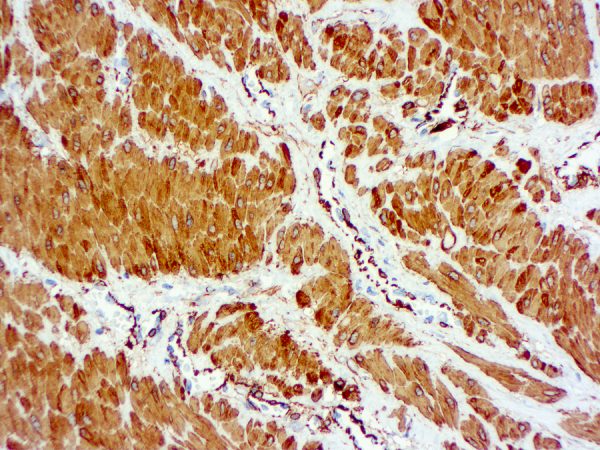Discontinued
Antibody (Suitable for clinical applications)
Sample Type: FFPE Patient Samples.
Tested Applications: IHC. Approved for In Vitro Diagnostic Procedures on FFPE tissues. For tissue collection recommendations, please see datasheet sent with product.
Application Notes
Prior to use, inspect vial for the presence of any precipitate or other unusual physical properties. These can indicate that the antibody has degraded and is no longer suitable for patient samples. Please run positive and negative controls simultaneously with all patient samples to account and control for errors in laboratory procedure. Use of methods or materials not recommended by enQuire Bio including change to dilution range and detection system should be routinely validated by the user.
| Specification | Recommendation |
|---|---|
| Recommended Dilution (Conc) | 1:50-1:100 |
| Pretreatment | EDTA Buffer pH 8.0 |
| Incubation Parameters | 30 min at Room Temperature |
Clonality: Monoclonal
Anti-Actin, Smooth Muscle Antibody Clone: 1A4
Host and Isotype: Mouse IgG2a, kappa
Recommended Positive Control Sample: Leiomyoma, Colon
Cellular Localization of Antibody 1A4 Staining: Cytoplasmic
Buffer and Stabilizer: PBS with 1% BSA and 0.05% NaN3
Antibody Concentration: Lot specific. Plese contact tech support for data.
Immunogen: BALB/C mice were injected with N-terminal decapeptide of alpha-smooth muscle actin.
Storage Conditions: This antibody should be stored refrigerated (2-8°C). This product should not be used past the expiration date printed on the vial.
Actin, Smooth Muscle Information for Pathologists
Summary:
Discovered in 1986 (J Cell Biol 1986;103:2787). Antibodies to alpha smooth muscle actin do not detect the other actin isoforms. Terminology Also called smooth muscle actin, SMA; clone 1A4 or sm-1. Clinical featuresNotable Clinical Features:
No apparent deficiency in intestinal pseudoobstruction (J Clin Pathol 2004;57:1168). May predict aggressive behavior in cutaneous basal cell carcinoma (Hum Pathol 2010;41:1128) and pancreatic ductal adenocarcinoma (Pancreas 2010 May 7 [Epub ahead of print]). Predictor of good prognosis in lung adenocarcinoma (Mod Pathol 2009;22:776). A potential prognostic factor in idiopathic pulmonary fibrosis (Clinics (Sao Paulo) 2012;67:1039). InterpretationCommon Uses By Pathologists:
Identify smooth muscle cells and myofibroblasts in normal, reactive (Am J Respir Cell Mol Biol 1999;20:582) or neoplastic tissue (Am J Dermatopathol 2006;28:105). Identify myoepithelial cells in normal, neoplastic or diseased breast, salivary glands or sweat glands; may be helpful to rule out invasion; may be particularly important in cytology specimens (Anticancer Res 2003;23:4175). Identify pericytes to correlate with hematogenous metastasis and prognosis (Oncology 2005;69:159). Help distinguish pleuropulmonary desmoid tumors (SMA+) from solitary fibrous tumor (SMA-, Arch Pathol Lab Med 2006;130:1503). Note: in breast papillary lesions, p63 is more sensitive and specific because smooth muscle actin also stains stromal cells (J Clin Pathol 2007;60:315).Limitations and Warranty
This antibody is manufactured in accordance with clinical good manufacturing practices in an ISO13485:2016 certified production facility. It is intended for multiple uses including in vitro diagnostic use and research use only applications. Please see vial label for expiration date. We strive to always deliver antibodies with a shelf life of at least two years.






There are no reviews yet.